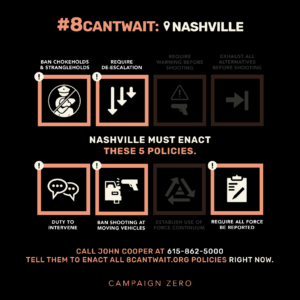
Advocates for police reform have called for eight changes they believe will reduce killings by law enforcement. The recommendations, which include requiring officers to exhaust all options before shooting, have been widely shared on social media with the hashtag #8cantwait.
A recent review by Nashville’s Community Oversight Board reveals the Metro Nashville Police Department has already adopted some of these policies but still has room for improvement.
The board, which investigates claims of police misconduct and recommends policy changes, wants Metro Police to make three additional adjustments to its manual.
The group wants MNPD to expand its new ban on chokeholds to include other types of neck restraints. They also want the department to require de-escalation before officers use force and more specific wording in its ban on shooting from a moving car.
Clearer language in the department manual won’t completely solve the problem, says Peter Vielehr, the oversight agency’s lead researcher. But he says that data suggest it can make a big difference.
“There’s additional research, outside of #8cantwait analysis, that does show that restrictive use of force policies is correlated with fewer lethal and non-deadly uses of force,” he told board members when presenting his findings at a meeting Wednesday evening.
More: Read the full report here.
That finding is backed up back by research from Campaign Zero, the national organization that launched #8cantwait. The group’s data scientist found that “police departments that implement all eight use-of-force policies would kill 72% fewer people on average than departments with none of these policies in place.”
However, Vielehr said such a statistic could be misleading since few, if any, departments haven’t codified a single one of these policies. He added that drops in killings were also correlational and could potentially be attributed to other factors.
But Vielehr said joining the campaign would only help MNPD’s outcomes, even if it wouldn’t be a cure-all.
“This is a start,” he said. “These policies will not get us to zero, and they’re not intended that way. These are very mainstream policy proposals that are endorsed by leading police organizations.”
Vielehr found that MNPD had already implemented most of the #8cantwait policies. Some of those police changes came years ago, and others in the past few weeks.
 Courtesy Community Oversight Board
Courtesy Community Oversight Board An image posted on social media in the days after George Floyd was killed by a Minneapolis police officer helped to spur reviews of the Metro Nashville Police Department’s policies.
According to the oversight agency, Nashville’s police department had implemented four of the eight recommendations before protesters started marching through downtown this spring. After residents urged officials to endorse all eight policies, MNPD announced in mid-June that it had compared the #8cantwait principles with its own manual and had taken steps to remedy the gaps it uncovered.
The department officially banned chokeholds and strangleholds, which were already illegal in most cases under Tennessee law, though the COB has suggested tweaks to the new language. MNPD also added training that reminds officers of their duty to intervene if they see a colleague breaking the law or using excessive force.
Mayor launches use-of-force committee
The department has said it “remains committed” to reviewing its training and use of force policy.
“Our police department embraces the principles put forward in #8cantwait,” Chief Steve Anderson said in a statement released June 15. “We will continue to review, improve and strengthen MNPD policies that guide our officers.”
Mayor John Cooper has asked the department to complete a full review of its use-of-force policies. Earlier this month, he signed onto former President Barack Obama’s Mayor’s Pledge, which urges mayors, city councils and police oversight groups to reform their protocols. Cooper is assembling a task force to complete a comprehensive review, with help from the COB and community members.
Board members expressed some concerns about the task force at Wednesday’s meeting. Several questioned why the mayor’s office organized meetings behind closed doors, instead of leaving the work to the COB — a board voted into existence by the people of Nashville, in order to restore residents’ trust in police.
“We absolutely do want to involve the COB in this,” said John Buntin, the mayor’s policy director. “We welcome the partnership to do that. By assembling a broad and diverse group to also undertake in the analysis of this, we think we can bring more attention to this issue.”
But board members said that former mayors had already solicited feedback on police practices on multiple occasions, only to see their hours of work shelved by the next administration.
“We have to be aware of inquiry fatigue,” said board member Phyllis Hildreth. “What does it mean to keep asking people over and over again to give their opinion, to tell their stories about matters that are deeply important and deeply painful when they have not been listened to?”
Samantha Max is a Report for America corps member.

